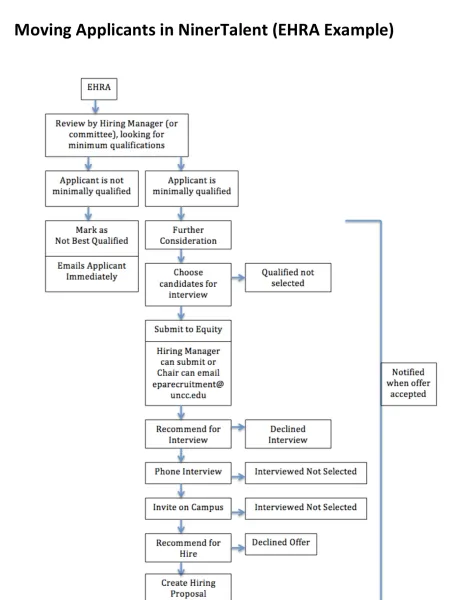Search committees are a powerful element of the hiring process, and the strength and effectiveness of our searches often sit with this group of individuals. Because search committees are reviewing, evaluating, and recommending candidates, it is important to create committees and structures that allow for the most inclusive process possible. From selecting committee members, providing effective training and resources, to acknowledging common biases, a well-considered and well-trained search committee can be a vital asset.
Points to consider:
- Importance of broadly representative search committees
- Who gets tapped and how often?
- The dynamics of the search committee
- Are there power relationships in the committee, what different roles do the committee members play in relation to the open position, etc.
- Importance of training search committee members on unconscious bias
Build a diverse search committee in order to enhance efforts to recruit applications and evaluate candidates. The University states that diverse search committees demonstrate a good faith effort to generate a diverse applicant pool.
Some considerations when building a search committee are:
- The search committee size depends on the chair and hiring official, but the fewer members the easier it is to schedule meetings and make decisions. Search committees generally include no fewer than three and no more than ten members, with exceptions based on search needs.
- Select members based on the basis of skill and judgement they can contribute to the search process, not solely because they represent a particular constituency. Constituency members can have input through submitting questions, recruitment strategies and candidate open forums in addition to membership on the search committee.
- Undergraduate and graduate students are encouraged to be on search committees, where possible and appropriate.
- All committee members are expected to be aware of and act against unconscious and conscious biases.
Ideally, the search committee is selected at the beginning of the search process so that they may actively support recruitment of candidates.
The search committee is selected by the Hiring Manager to narrow the pool of candidates to those who are best qualified for the position
- Review all forwarded applications towards narrowing the pool to the best-qualified candidates for telephone and/or on-campus interviews. On-campus interviews should include 3-4 candidates. Exceptions are made for pools that do not net this number of qualified candidates. Chair completes paperwork to submit to Hiring Manager and Vice Chancellor of Student Affairs.
- Propose who should be involved as interviewers in the on-campus interview process to the hiring manager.
- elect a host (or hosts if necessary, for scheduling) for the on-campus interview process to get the candidate from the hotel to campus and back, to ensure the person has breaks and gets from interview location to interview location.
- If the committee cannot take on this responsibility due to scheduling, a secondary plan must be arranged in conjunction with the hiring manager. It is preferred that candidates will be transported to and from the airport, hotel and interviews by a staff person or student who is appropriately trained or knowledgeable in how to represent UNC Charlotte.
- Collects on-campus interview candidate evaluations for review unless delegated to the Administrative Support person for the search.
- Makes recommendations to the hiring manager of all candidates who are qualified for the position, including strengths and areas of potential improvement.
What is the difference between Affirmative Action and Diversity?
Diversity has been defined as differences among people, as well as "differences among groups of people." Diversity at UNC Charlotte includes all such differences, which are valued because they contribute to the educational mission of the institution. Affirmative Action is one vehicle we use to help us achieve our diversity goals. Affirmative Action is a program which includes efforts to improve the employment or educational opportunities of members of minority groups and women.
Who is responsible for assuring University meets affirmative action and diversity goals?
Diversity and Affirmative Action are everyone’s responsibility. Although the Human Resources department is charged with legal compliance of all EEO/AA laws and mandates, this can only happen with cooperation from departments and search committees. Since is generally a “bottom up” process with the members of a search committee defining the pool of candidates and assessing their qualifications, affirmative action and diversity goals will never be achieved without the understanding and commitment of the entire campus community.
The chief administrator in each unit along with the Student Affairs Executive Director serve as the Unit Affirmative Action Officer and responsible for all efforts within the unit regarding equal opportunity and affirmative action as specified in the University’s Affirmative Action Plan.
These responsibilities include advertising or announcing vacancies where they are likely to be seen by a wide variety of prospective applicants, including people from underrepresented identities and women; requesting assistance of institutions, organizations, and colleagues to identify qualified applicants from protected groups; and ensuring that applications are reviewed and decisions are taken in compliance with the University’s commitment to affirmative action, equal opportunity employment, and cultural diversity
- Initial Search Committee meeting
- Ask the hiring manager to be present or provide a written charge to the committee sharing the skills and qualifications for the ideal candidate, timeline, and job description. Allow time for questions if the hiring manager is present.
- What knowledge, skill or ability is most important? What is a deal breaker?
- Discuss and develop goals and ensure there is agreement about the selectioncriteria regarding candidates to phone interview and bring on campus and the interview questions/rubric used to evaluate candidates.
- Establish ground rules such as; timeliness, attendance, confidentiality throughout the processand in perpetuity, and decision making.
- Discuss roles and expectations of the search committee members
- SHRA candidates will be initially screened by HR for qualifications, then passed to the search committee for further review.
- EHRA candidates will be screened by the search committee. The chair and/or hiring manager may choose to screen candidates for required qualifications, prior to forwarding candidates to the committee.
- Ensure the hiring manager or search committee chair leads a discussion on implicit biases.
- Provide members with information on timeline, password and login for hiring website, and job description; and informationor examples that detail rubrics and interview questions.
- Ask the hiring manager to be present or provide a written charge to the committee sharing the skills and qualifications for the ideal candidate, timeline, and job description. Allow time for questions if the hiring manager is present.
- Build rapport among committee members
- During the first meetings allow time for introductions, be enthusiastic, and express appreciation for their time and future efforts
- Actively involve all committee members in discussion and search procedures. Be sure to check-in on those who have not spoken or those who have dissenting opinions.
- Run efficient meetings by creating an agenda for each meeting and try to start and end the meetings on time.

